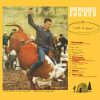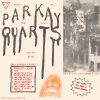
By Eleni P. Austin
“I didn’t come here to dream, or teach the world things/Define paradigms or curate no livin’ days.” That’s the opening salvo, “Master Of My Craft” on Parquet Courts’ stunning long player, Light Up Gold. Singer/guitarist Andrew Savage spits out the words over slashing guitars and a frenetic cadence. Letting the listener know, despite the hyperbole, this NYC band hasn’t arrived to save Rock & Roll.
Throughout 2013 several artists were touted as “the next big thing.” Sometimes the hype was overrated, (Haim, Lorde). Sometimes the prognostication was right on the money, (Bleached, Palma Violets). The praise surrounding Parquet Courts is much deserved.
Parquet Courts was formed in New York City in 2010. Texas transplants, Andrew Savage and Austin Brown (guitar/vocals), hooked up with bassist Sean Yeaton in Brooklyn. Everything came together when they recruited Andrew’s younger brother, Max, to play drums.
The band immediately began woodshedding. By day they all held menial jobs, at night they gigged throughout the five boroughs. By 2011 they put out their debut, American Specialties (a limited cassette release), that only hinted at their greatness.
Light Up Gold originally arrived in early 2013, but it was recently re-released, bundled together with a 5 song EP, Tally All The Things That You Broke.
Light Up… opens with a tight four song suite, “Master My Craft,” “Borrowed Time,” “Donuts Only” and “Yr No Stoner.”
“Master…” shifts seamlessly into “Borrowed Time.” Blending an off-kilter stop-start rhythm, pogo-riffic bass lines and see-saw guitar, the lyrics delve into the frustration of writer’s block….”I was feeling nostalgic for the days when my thoughts dripped onto my head from the ceiling/I remember the feeling of the museless existence, of the drunk, bored and listless endless waiting for something I knew wasn’t coming.”
“Donuts Only” weds a tick tock beat to metronome bass and squally, feedback-drenched guitar. The lyrics poke gentle fun at the cultural differences between Texas and New York…“Like a red state’s Baptist fervor, like a small town’s unsolved murder/ Some secrets are just best resting in the tombs of buried thought-slums/ As for Texas, donuts only, you cannot find bagels here.”
Finally, “Yr No Stoner” echoes the minimalist pleasures of the Velvet Underground. The melody is wrapped tightly in strummy, intertwined guitars. Savage’s deadpan vocals unconsciously approximate Lou Reed’s laconic tone as he unspools a laundry list insider Brooklyn references.
Parquet Courts display songwriting chops that belie their tender ages. Three songs, “Careers In Combat,” “Light Up Gold II” and “Stoned & Starving,” exemplify their ability to combine cogent lyrics and sharp, economical melodies.
“Careers” is accented by spidery guitar riffs and tumbling drums. The lyrics render trenchant observations on the scarcity of gainful employment…”There are no more summer lifeguard jobs, there are no more art museums to guard/ The lab is out of white lab coats, cause there are no more slides and microscopes/But there are still careers in combat, my son!”
Throbbing bass fills and thundering percussion buttress “Light Up Gold II” The lyrics offer a mordant meditation on the creative process…”Sifting like a miner through the conscious debris, hunched down gleaning embers from a burning field/ Trying to find something warm and real.”
“Stoned & Starving” is the album’s best track, the melody locks into an hypnotic groove, weaving circuitous guitar chords that spits feedback one minute and workman-like riffs the next. The narrator sets off on a Homeric odyssey to curb his munchies…”I was debating Swedish fish, roasted peanuts or licorice, I was so, so stoned and starving.”
Every track on Light Up Gold is a winner, but stand- outs include the psychedelic mash-up of “Yonder Is Closer To The Heart” and “North Dakota,” which highlights the desolate charms of the 39th state. “Disney P.T.” is a frenetic treatise on a girlfriend’s strengths and weaknesses…”My girl’s a borealis-lit fjord, my girl’s a summons ignored/A beer that’s freshly poured, a lost tribe’s library stored.”That song flows into “Tears O’ Plenty. Spiky boomerang riffs collide with a tribal beat. The lyrics offer a withering assessment of a failed relationship.
Light Up Gold closes with “Picture Of Health,”a slightly somber post-mortem on faded love…”My last guilt-themed solicitation, delivered slowly in hesitation/ It could not sooth me, could not seduce me into repairing these strokes so loosely.” It ends the album with a touch of ambivalence.
The Tally Up All The Things That You Broke EP, released under the Parkay Quarts pseudonym, consists of five songs. Yelped over a maelstrom of feedback, the band makes the case that physical pain is easier than emotional distress, on the opener, “You’ve Got Me Wonderin’ Now.” “…A toothache’s better than heartache, baby/ Seasick’s better than heartsick, baby!”
“Descend (The Way)” and “Fall On Your Face” are short and sweet rants comprised of downstroke riff-age and pummeling backbeats.
The most amazing track on the EP is “The More It Works.”Jittery chords crash over a hiccup-y rhythm, this song shares musical DNA with Gang Of Four’s seminal “Guns Before Butter.” The lyrics repeat the frenetic mantra “the more you use it, the more it works.” It’s up to the listener’s imagination to determine what “it” is, (genitalia, or a new slide ruler, you decide!)
The EP closes with “He’s Seein’ Paths.” An aural collage that echoes ‘80s pioneers like Devo and Violent Femmes as well as ‘90s stalwarts, Beck and Soul Coughing.
Parquet Courts’ sound conjures up a laundry list of antecedents, the terse expressionism of the Velvet Underground, the skronky feedback of Crazy Horse. Their tensile agility echoes the compact efficiency of British bands like Buzzcocks, Gang Of Four and Wire. Their shaggy dog tales specific to NYC recall Punk Pioneers like The Ramones, Television and the Dead Boys. The brevity of their songs is mindful of the late, great Minutemen.
Yes, their music is primitive, dense and rudimentary. It’s also highly addictive. Once the needle leaves the groove, the listener is left with one subconscious mandate: “again.”















































